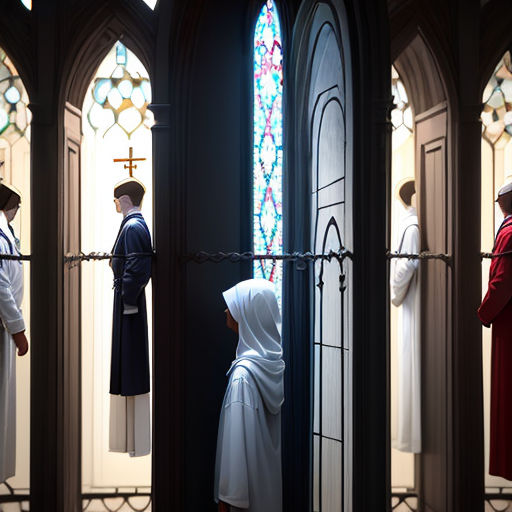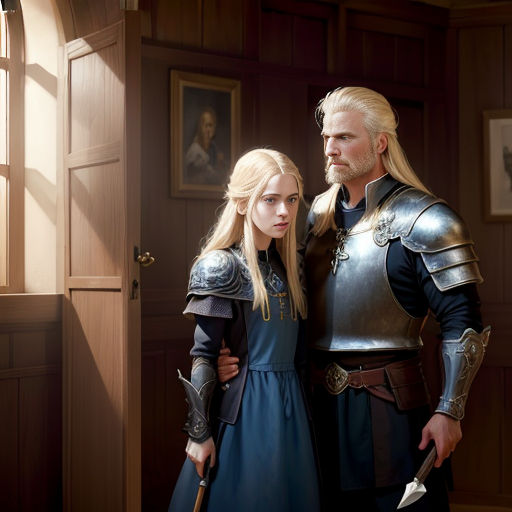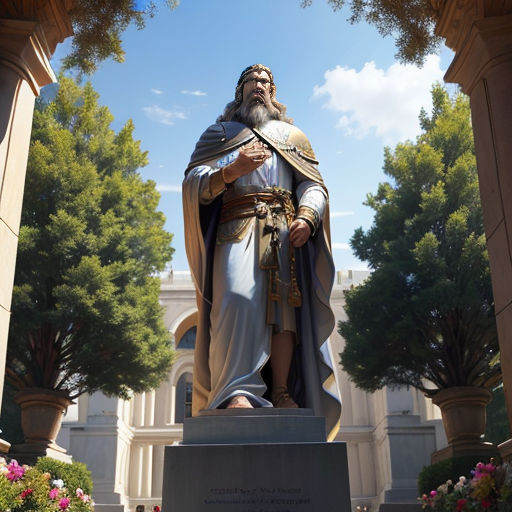
The Conversion of the Barbarian King
By Storybird

02 Oct, 2023

In the heart of a German kingdom, lived a fierce and powerful barbarian king, known as King Alaric. His reputation was as wild as the northern winds, and his rule as harsh as the winter's frost.

King Alaric was a loyal follower of Wotan, the Germanic god of war, wisdom, and poetry. He led his people with the belief that Wotan was their true guide and protector.

One day, while hunting in the woods, King Alaric saw a cross glowing in the sky. He was awestruck by this celestial spectacle and felt a strange sense of serenity wash over him.

King Alaric interpreted this vision as a divine message. After much contemplation, he made the decision to convert to Christianity, believing that the cross was a sign from God himself.

Upon his return, the king declared his new faith to his people, hoping they would follow suit. His announcement, however, was met with shock and disbelief.

The people of the kingdom were devout followers of Wotan and saw this as a betrayal. They couldn't comprehend why their king would forsake their god for a foreign deity.

The king's decision sparked a rebellion amongst his people. They rose in defiance, rejecting their king and his new faith. The kingdom was thrown into chaos.

Leading the rebellion was a mighty warrior named Gunther, who was a devout follower of Wotan. He saw the king's conversion as an act of treason and vowed to restore their old faith.

Gunther rallied the people, their anger and confusion fueled their rebellion. The once united kingdom was now divided, with the king on one side and his people on the other.

Despite the rebellion, King Alaric stood firm in his beliefs. He prayed for guidance and strength, hoping to lead his people towards the path of Christianity.

The rebellion culminated in a bloody battle. Gunther, driven by his faith in Wotan, challenged King Alaric to a duel, promising to end the reign of the Christian king.

The fight was fierce, but in the end, Gunther emerged victorious. King Alaric was struck down, his reign abruptly ended by the blade of his own people.

With the king's death, the people believed they had succeeded in preserving their faith. However, the seeds of Christianity had already been sown in the kingdom.

Despite the king's demise, stories of his conversion and the cross in the sky spread throughout the kingdom. It sparked curiosity among some, who began to question their old beliefs.

Slowly but surely, individuals started to convert to Christianity. They saw in it a message of love and forgiveness, a stark contrast to their previous beliefs.

Gunther tried to suppress these conversions but found it increasingly difficult. The idea of a new faith had taken root and was growing despite his efforts.

Eventually, Gunther's own daughter, Brunhilda, converted to Christianity. She had been moved by the stories of King Alaric's faith and the message of the new religion.

Brunhilda's conversion was a blow to Gunther. He felt betrayed, but he also saw the conviction in his daughter's eyes, mirroring King Alaric's when he declared his new faith.

Despite the resistance, Christianity continued to spread across the kingdom. People were drawn to its teachings, and over time, it replaced Wotan as the primary faith.

As the years passed, the rebellion faded into history. King Alaric's tale was told and retold, his memory living on in the hearts of the kingdom's new Christian followers.

Gunther, once a figure of defiance, found himself a relic of the past. Even he couldn't deny the profound change that had swept over his people.

Brunhilda became a beacon of the new faith. She dedicated her life to spreading the teachings of Christianity, embodying its message of love and compassion.

The story of King Alaric's conversion was a catalyst for change. His decision led to rebellion and chaos, but it also paved the way for a new era of faith.

The king's sacrifice was not in vain. His vision of the cross in the sky had sparked a transformation that outlived his reign, reshaping the spiritual landscape of his kingdom.

King Alaric's tale served as a reminder that change is often met with resistance, but it is the spark that lights the fire of progress, forever altering the course of history.

The kingdom once torn by rebellion, was now unified under a new faith. The echoes of Wotan's worship faded, replaced by the harmonious chimes of church bells.

A monument was erected in King Alaric's honor, standing tall in the heart of the kingdom. It served as a symbol of his faith and the profound change it brought.

As time passed, the story of King Alaric, the barbarian king who embraced Christianity, became a legend. His legacy lived on, inspiring generations to come.

The conversion of King Alaric was a turning point in the kingdom's history. His faith, though initially met with resistance, eventually brought unity and transformation.

The kingdom's faith had shifted from Wotan to the cross, from the old gods to the new. The story of King Alaric was testament to the power of faith and the inevitability of change.

The legacy of King Alaric's conversion was a testament to the transformative power of faith. His tale served as a beacon, illuminating the path for those who seek to embrace change.

King Alaric's story was more than just a tale of conversion, it was a story of faith, resistance, transformation, and the power of a vision to change the course of history.

The story of King Alaric's conversion forever echoed in the kingdom, a reminder of the change that had once swept through their land and the faith that now unified them.

The conversion of the barbarian king was a pivotal moment in the kingdom's history. Despite the initial turmoil, it ushered in an era of unity and faith, shaping the kingdom's future.

King Alaric's tale ended, but his legacy lived on. The cross in the sky was more than just a divine sign, it was the beginning of a new chapter in the kingdom's history.